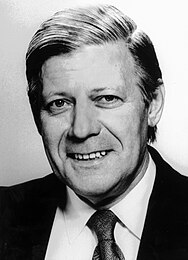Robert Gleitzmann
Robert Gleitzmann | |
|---|---|
 Gleitzmann in 1975 | |
| 8th Prime Minister of Besmenia | |
| In office 21 February 1972 – 13 March 1980 | |
| President | Thomas Albrecht Erwin Pohl |
| Preceded by | Johannes Schmidt |
| Succeeded by | Martin Beiter |
| Chairman of the Besmenian People's Party | |
| In office 31 March 1969 – 7 September 1983 | |
| Preceded by | Helmut Glaubrecht |
| Succeeded by | Michael Möhring |
| Mayor and Governor of Laitstadt | |
| In office 23 April 1963 – 21 February 1972 | |
| Preceded by | Egon Lochmann |
| Succeeded by | Rainer Fischer |
| Member of the Federal Chamber | |
| In office 1972–1983 | |
| Interior Minister in Laitstadt | |
| In office 1959–1963 | |
| Member of the State Chamber of Laitstadt | |
| In office 1952–1972 | |
| President of the Federal Senate | |
| In office 1 January 1964 – 31 December 1964 | |
| Preceded by | NAME |
| Succeeded by | NAME |
| Personal details | |
| Born | Robert Georg Gleitzmann 23 February 1916 Kaltberg, Metakumburg, Kingdom of Besmenia |
| Died | 21 November 1999 (aged 83) Laitstadt, Besmenia |
| Cause of death | Cancer |
| Political party | Besmenian People's Party (1937-1983) |
| Spouses |
|
| Children | 1 |
Robert Georg Gleitzmann (23 February 1916 - 21 November 1999) was a Besmenian politician, who was Prime Minister of Besmenia between 1972 and 1980. He was also chairman of the Besmenian People's Party from 1969 to 1983. Gleitzmann also served as Mayor of Laitstadt from 1963 to 1972.
Gleitzmann was born Kaltberg near Laitstadt in 1916 and began studying law and politics in 1933. In the 1954 Laitstadt state election, Gleitzmann was able to get a seat in the State Chamber of Laitstadt. In 1959, Gleitzmann became a member of the regional state government in Laitstadt as Minister of the Interior. After the unexpected death of the mayor of Laitstadt, Egon Lochmann, Gleitzmann became his successor. In 1969 he became chairman of the Besmenian People's Party and stood as a BVP candidate in the Federal Chamber elections of 1972, 1976, 1980 and 1981.
After the 1972 election, Gleitzmann became Prime Minister and formed a government coalition with the right-wing populist BRP until 1980. While Gleitzmann and his government were admired for the economic policies and strengthening of the economy in the West Besmenian states, the government was often criticized in other policy areas. Through some of his policies and his isolation policy, Gleitzmann was strongly criticized by opponents in Besmenia and abroad for turning Besmenia into an autocratic state. Three years after the end of his premiership, the corruption cases and illicit BVP party donations made by Gleitzmann during his time as Prime Minister, which led to a crisis in Besmenian domestic politics, were uncovered under the designation Gleitzmann scandal.
Throughout his political career, Gleitzmann was a controversial figure in his country's political life. His personality, his collaboration with the BRP, his political style, and his ideology were effective and controversial well beyond his tenure. To this day, Gleitzmann remains a controversial figure in Besmenian politics.
Early Life and education
Robert Georg Gleitzmann was born in 1916 in Kaltberg, a suburb of Laitstadt, as the youngest of two sons of the teacher couple Ludwig Gleitzmann (1879–1964) and Käthe Gleitzmann, née Meißen (1882–1970). His older brother was Bernard Gleitzmann (1911-1982).
Political career

Member of the State Chamber of Laitstadt and Interior Minister (1954-1972)
Mayor of Laitstadt (1963-1972)
After the unexpected death of the Mayor of Laitstadt Egon Lochmann on April 23, 1963, the majority of the State Chamber of Laitstadt elected Gleitzmann as his successor. He continued the blue-red coalition. In the 1964 Laitstadt state election, Gleitzmann ran for the BVP as their candidate, where the BVP was able to increase its result by 7.3%.
BVP leadership (1969-1983)
Prime Minister

First term (1972-1976)
Second term (1976-1980)
Gleitzmann scandal
In September 1983, under the name Gleitzmann scandal, the corruption cases and illicit BVP party donations made by Gleitzmann during his time as Prime Minister are exposed and made known to the public. Three days after the discovery, Gleitzmann resigned from his position as party chairman. The Gleitzmann scandal led to a crisis in the Besmenian domestic politics, in the BVP and in the BRP. During a police search of Gleitzmann's apartment in the course of the scandal, extensive documents that Gleitzmann had created for the bribes were seized. On October 18, Gleitzmann was suspended from the BVP. A committee of inquiry set up by the Federal Chamber dealt with the scandal from October 1983 to May 1987, accompanied by fierce partisan disputes. In November 1983 Gleitzmann came into custody and until May 1984 had to face the corruption and abuse of office several times. The trial ended with his conviction for corruption and abuse of office to two years' imprisonment. He had to begin his sentence on June 16, 1984 in the Laitstadt-Heideneck correctional facility. In November 1985, after serving a total of 17 months of the two years, he was paroled at the age of 70.
Personal life
Gleitzmann married the school teacher Regina Möller in 1949. In 1951 their son Bruno Gleitzmann-Möller was born. The couple separated in 1954 and divorced in the same year. In 1958 Gleitzmann married Anna Frahm. By marrying Frahm, Gleitzmann became the stepfather of Frahm's daughter Karina Beiner, who was born from her first marriage.
